When you're considering buying an iPhone in Mexico, you'll notice the prices are generally higher than in the U.S. due to factors like the 16% Value Added Tax (VAT) and import tariffs. For example, the iPhone 14 Pro can range from $999 to $1,499, and the iPhone 14 Pro Max is between $1,099 and $1,599. But why are these prices so different, and is there a way to mitigate these costs? Let's explore the dynamics affecting iPhone pricing in Mexico and whether buying from the U.S. might be a better option.
Iphone Pricing in Mexico
When it comes to iPhone pricing in Mexico, you're likely to notice a few key differences compared to other markets. iPhone prices in Mexico tend to be on the higher side, influenced by various factors such as import fees and the country's 16% VAT. For instance, the iPhone 14 starts at approximately $799 for the 128GB model and can go up to $1,099 for the 512GB version. This reflects the base cost without any carrier subsidies.
Moving up the ladder, the iPhone 14 Pro is priced from $999 for the 128GB variant to $1,499 for the 1TB model. These prices are indicative of open, unsubsidized versions, meaning if you opt for a carrier contract, you might find some discounted rates. However, it's vital to take into account that these contracts often come with their own set of commitments and conditions.
The highest-end model, the iPhone 14 Pro Max, begins at around $1,099 for the 128GB option and can reach up to $1,599 for the maximum 1TB storage. Again, these are the prices for open versions, providing you the flexibility to choose any carrier. The import fees and VAT greatly contribute to these higher iPhone prices, making them more expensive compared to markets like the U.S.
Understanding these factors is fundamental if you're planning to purchase an iPhone in Mexico. While carrier contracts might offer some relief, the general trend remains that iPhones are a bit pricier here. So, if you're budgeting for a new device, keep these price points and additional costs in mind to make an informed decision.
Comparison With U.S. Prices
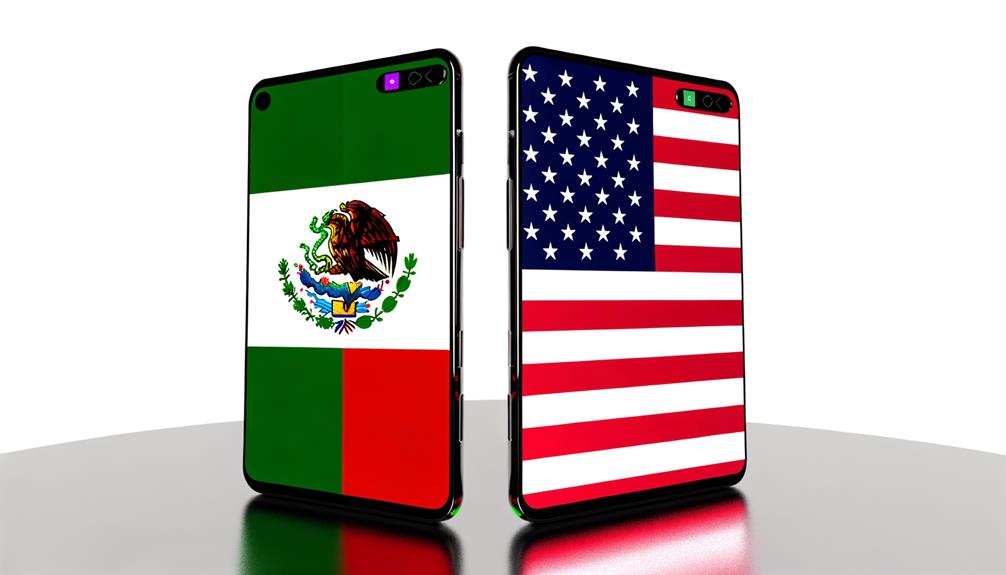
When comparing iPhone prices in Mexico and the U.S., you'll notice a significant cost difference due to various factors. In Mexico, higher prices are largely driven by a 16% VAT and additional import tariffs, whereas the U.S. benefits from competitive market dynamics and lower taxes. Additionally, Mexican iPhones offer more flexibility with both physical SIM trays and eSIM, unlike their U.S. counterparts that feature only eSIM technology.
Price Differential Analysis
Examining the price differential between iPhones in Mexico and the U.S. reveals notable discrepancies that are worth analyzing. For example, the iPhone 15 Pro Max, priced at $999 in the U.S., jumps to a steep $1,390 in Mexico. This stark contrast is influenced by several factors that ultimately make purchasing an iPhone in Mexico far more expensive.
You'll find that local taxes play a large role. Mexico imposes a 16% Value Added Tax (VAT) on electronics, driving up the cost considerably. Additionally, import fees further inflate prices, making the iPhone 15 Pro Max and other models much pricier than their U.S. counterparts. In the U.S., fierce competition among smartphone manufacturers helps to keep prices relatively lower. Companies are constantly vying for market share, resulting in more competitive pricing strategies. However, the Mexican market doesn't experience the same level of competitive pressure, allowing sellers to maintain higher prices.
Moreover, the economies of scale in the U.S. contribute to lower costs. High demand and larger sales volumes allow for more efficient production and distribution, reducing per-unit costs. In contrast, Mexico's smaller market and higher importation expenses add a premium to the price tags of iPhones, including the sought-after iPhone 15 Pro Max.
Factors Influencing Costs
Understanding why iPhones in Mexico are pricier than in the U.S. often boils down to several key economic factors. First, high import fees are a major contributor. When you purchase an iPhone in Mexico, you're not just paying for the device itself; you're also covering significant import duties that can sharply increase the overall cost. Additionally, Mexico imposes a 16% Value Added Tax (VAT) on all goods, including electronics like iPhones, making them even more expensive.
In contrast, the U.S. market benefits from lower import fees and a competitive landscape that drives prices down. Retailers and carriers often offer promotions and discounts that simply aren't as prevalent in Mexico. For example, while an iPhone 14 starts at $799 in the U.S., the same model can cost you between $799 to $1,099 in Mexico. Similarly, the iPhone 15 Pro starts at $1,390 in Mexico, compared to $999 plus taxes in the U.S.
Factors Affecting Costs
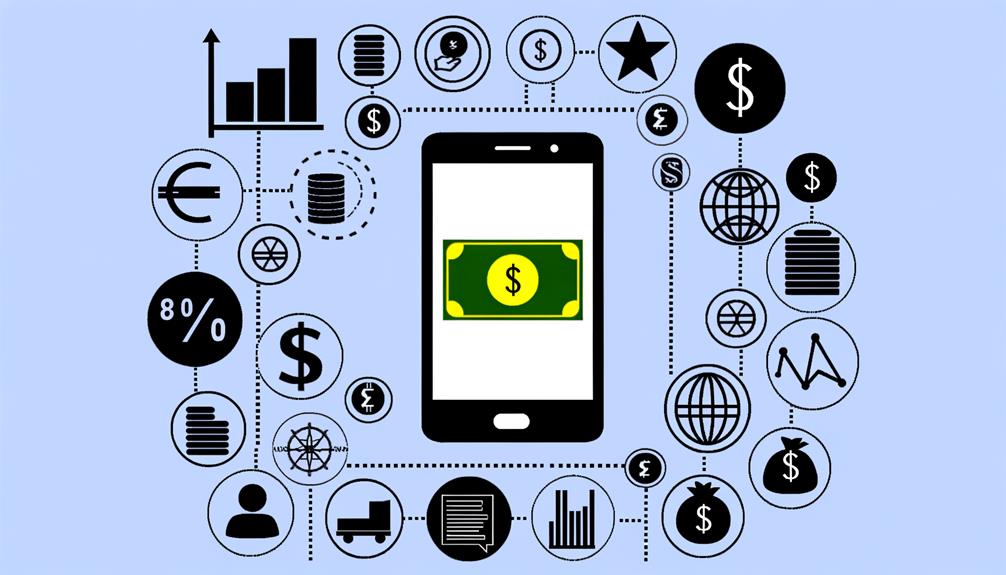
Although you might think iPhone prices are universally the same, various factors greatly affect the cost of these devices in Mexico. One of the most significant contributors is the import taxes. When iPhones are brought into Mexico, import fees add a substantial markup to the retail price. This means you're likely paying more compared to the U.S. market, where such taxes may not be as impactful.
Another essential factor is the Value Added Tax (VAT), set at 16% in Mexico. This sales tax is automatically included in the price you see, further inflating the cost. When you combine the import taxes with this VAT, it's easy to see why iPhones are pricier south of the border.
It's not just taxes that influence the cost, though. The U.S. benefits from intense market competition and economies of scale, which help keep component and retail prices lower. In Mexico, the market dynamics are different, often leading to higher prices. For instance, local demand and the availability of carrier contracts that can subsidize costs play a role. If fewer carriers offer subsidized prices, you might find yourself paying more upfront.
Additionally, the fluctuating exchange rates and economic conditions can impact the price you'll pay for an iPhone in Mexico. When the peso weakens against the dollar, the cost of importing goods like iPhones increases, which gets passed on to you, the consumer.
Understanding these factors—import taxes, sales tax, market dynamics, and economic conditions—can give you a clearer picture of why iPhone prices vary and why they're generally higher in Mexico.
Buying From the U.S
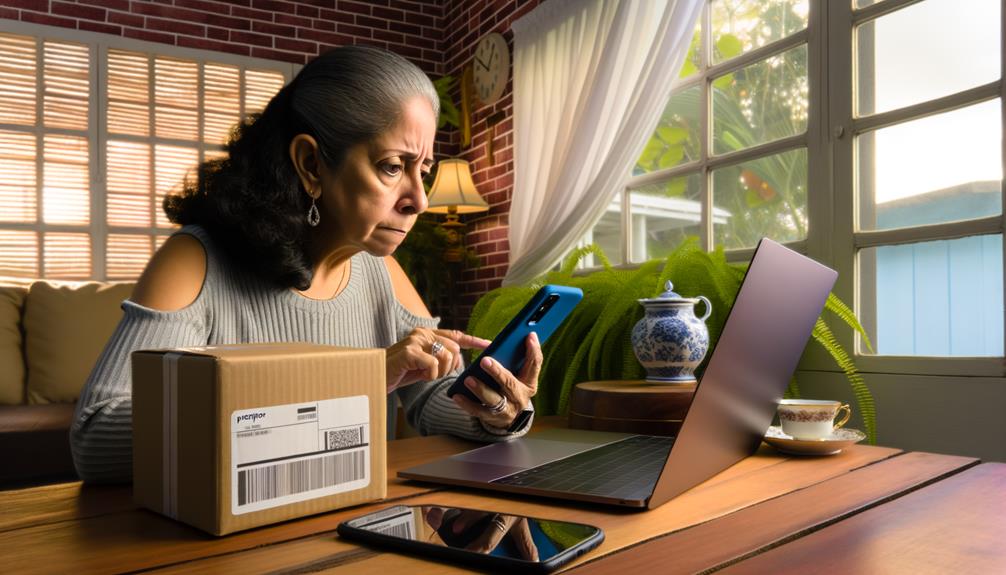
If you're considering buying an iPhone from the U.S., you'll notice that prices are generally lower, with the iPhone 14 starting at $799. However, you need to factor in import taxes and potential duties, which can affect the overall cost. Also, remember that newer U.S. models use only eSIM technology, so verify the device is accessible and compatible with Mexican networks.
Price Comparison Highlights
Comparing the prices of iPhones between the U.S. and Mexico reveals a significant disparity that could impact your purchasing decision. For instance, if you're looking to buy an iPhone, the iPhone 14 starts at $799 in the U.S., a price that's noticeably lower than in Mexico due to local taxes and import fees. When it comes to the iPhone 15 Pro, the U.S. price is $999 plus taxes, whereas in Mexico, it's around $1,390, making the U.S. a more attractive option for budget-conscious shoppers.
Why does this price gap exist? Several factors contribute, including higher demand, competitive pricing strategies, and economies of scale in the U.S. market. These elements allow American retailers to offer lower prices. Additionally, U.S. iPhones usually feature only eSIM technology, while Mexican models include both a physical SIM tray and eSIM, providing more flexibility for travelers.
However, it's essential to verify compatibility with local carriers before making a purchase. While the lower U.S. prices are tempting, remember that importing a U.S. iPhone to Mexico may incur taxes and duties, adding to the overall cost.
Import Considerations
Purchasing an iPhone from the U.S. to use in Mexico can seem like a savvy move, especially given the significant price differences. However, you need to evaluate several import factors to guarantee your Apple iPhone works seamlessly and remains cost-effective.
Firstly, importing an iPhone involves taxes and duties that could raise the overall cost. Make sure you account for these hidden fees before making a purchase.
| Factor | U.S. iPhone |
|---|---|
| Taxes and Duties | Potentially High |
| SIM Compatibility | eSIM Only |
| Carrier Flexibility | Unlocked Models |
Secondly, verify the compatibility of the U.S. iPhone with Mexican cellular networks. While U.S. models typically support eSIM technology, Mexican models offer both a physical SIM tray and eSIM, making them more adaptable for travelers.
Another advantage of U.S. unlocked iPhone models is the freedom to choose any local carrier in Mexico, which can potentially save you money on service costs. But don't forget, you'll need to adjust the language and regional settings for peak use in Mexico.
Importing U.S. Iphones
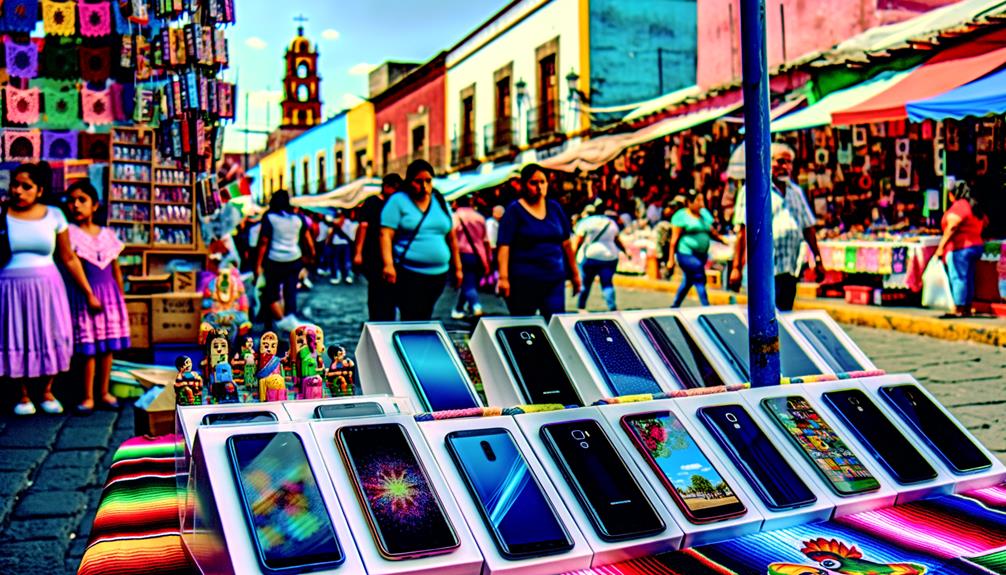
When considering importing a U.S. iPhone into Mexico, it's vital to understand the potential costs and technical differences that might affect your experience. Importing a new iPhone from the U.S. can seem like a cost-effective option at first glance, but you need to account for taxes and duties which can greatly raise the final price. Mexico imposes a 16% VAT on electronic goods, and additional import fees may also apply, making the overall cost comparable to or even higher than purchasing locally.
Another important factor is the technical differences between U.S. and Mexican iPhone models. U.S. iPhones usually lack a physical SIM tray and rely solely on eSIM technology. In contrast, Mexican models offer both eSIM and physical SIM options, giving you greater flexibility, especially if you're a frequent traveler. This difference can be a dealbreaker if you plan to switch SIM cards often or want to use multiple carriers.
While an unblocked U.S. iPhone can indeed be used with local carriers in Mexico, it's important to verify that the specific model you're importing is compatible with Mexican cellular networks. Not all U.S. iPhone models support the same frequency bands used by Mexican carriers, which might affect your phone's performance and coverage.
Lastly, don't forget to adjust the language and regional settings on your U.S. iPhone after importing it to Mexico. This guarantees that all features work correctly and that you get the most out of your new device. While the idea of importing a new iPhone from the U.S. can be tempting, these considerations are important for making an informed decision.
Carrier Compatibility
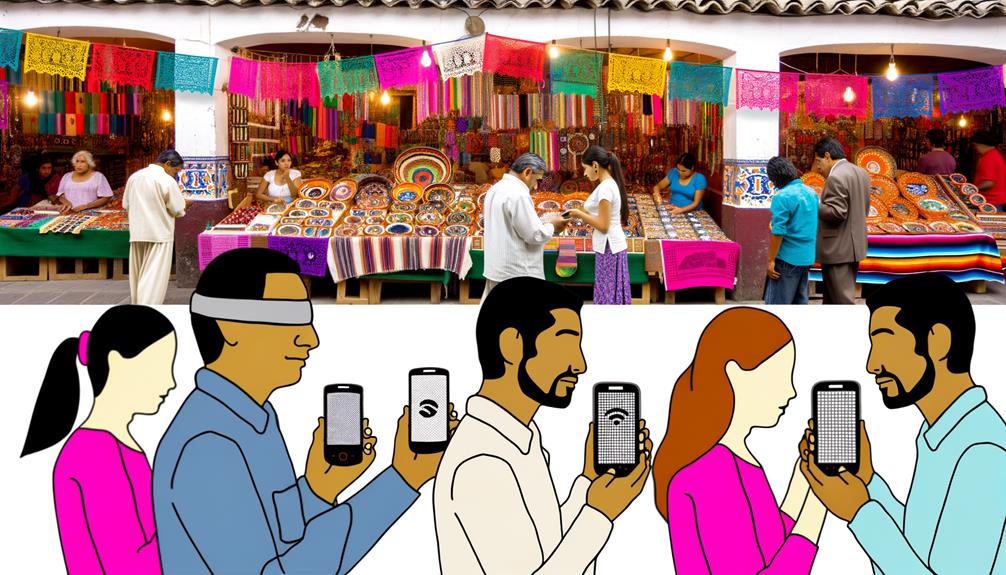
Confirming carrier compatibility is vital for a seamless iPhone experience in Mexico. When you're using one of the popular smartphones like an iPhone, having it function correctly on local networks is significant. Fortunately, iPhones sold in Mexico typically come equipped with both a physical SIM tray and eSIM technology. This dual capability provides you with the flexibility to easily switch between carriers or use multiple numbers, which can be especially handy for travelers or business users.
If you're bringing an iPhone from the U.S., you need to verify that your device is compatible with Mexican cellular networks. Unlocked iPhones are generally the best choice, as they can be used with any local carrier, allowing you to select a plan that fits your needs flawlessly. However, don't forget to check if your specific iPhone model supports the local bands and frequencies used by Mexican carriers. This confirms you get ideal performance and avoid connectivity issues.
For ideal user experience, it might also be necessary to adjust the language and regional settings on your U.S. iPhone once you start using it in Mexico. These adjustments can help you access localized content and services more efficiently.
Where to Purchase Locally
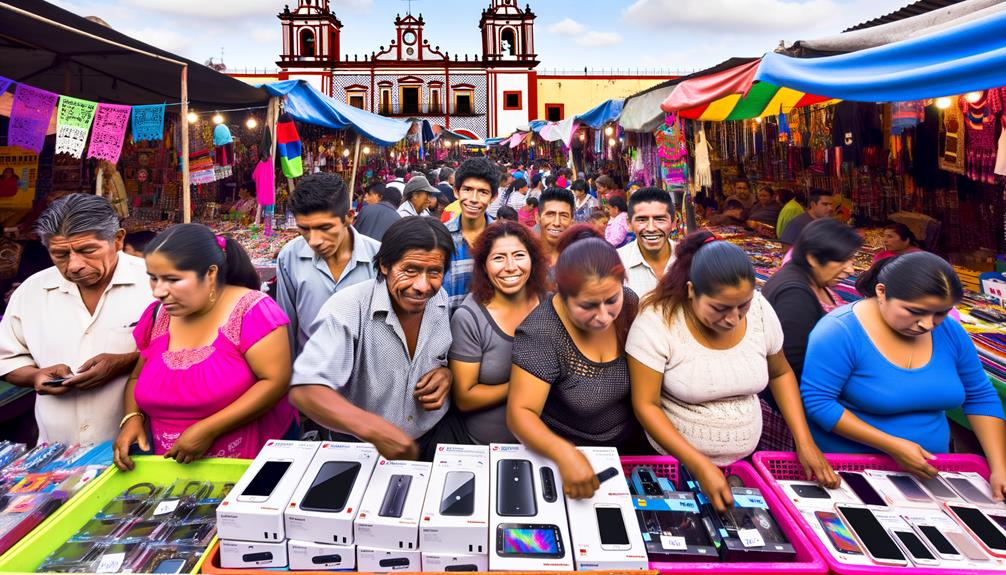
If you're looking to buy an iPhone in Mexico, there are several reliable options to contemplate. Authorized retailers like Best Buy, Liverpool, and Telcel stores are excellent places to start. These stores frequently offer promotions and installment payment options, making it easier for you to get the latest model with that advanced camera system you're eyeing. Keep an eye out for special deals that can save you some serious cash.
Another solid choice is the Apple Store in Mexico. Here, you'll find a wide selection of iPhone models and accessories. Plus, the added benefit of warranty and service support can give you peace of mind. Whether you're upgrading to a model with a better camera system or just need some accessories, the Apple Store has got you covered.
For those who prefer shopping online, Amazon Mexico features competitive pricing on iPhones. Often, you can snag discounts and enjoy fast shipping options. It's a convenient way to compare prices and find the best deal without leaving your home.
Local carrier stores like Movistar and AT&T also sell iPhones with various plans. These plans can sometimes include discounts if you commit to a contract, which might be beneficial if you're looking to save on upfront costs.
Lastly, don't forget about official Apple resellers in Mexico. They often conduct events or offer trade-in programs that can help reduce the cost of a new iPhone. This could be a great way to get the latest model, especially if you're interested in upgrading your camera system.
Frequently Asked Questions
Is the Iphone Cheaper in Mexico?
You'll find that, in a price comparison, iPhones are typically more expensive in Mexico than in the U.S. Import fees, a 16% VAT, and local economic factors drive up the costs, making them pricier overall.
How Much Is the Iphone 14 in Mexico?
For the iPhone 14, you're looking at a starting price of around $799 for the 128GB model in Mexico. The 512GB version can go up to $1,099, reflecting iPhone features, import fees, and local taxes.
How Much Is the Iphone 13 in Mexico?
You're looking at around $799 for the iPhone 13 with 128GB in Mexico, but it can go up to $1,099 for the 512GB model. iPhone availability and local taxes, like VAT, can affect these prices.
How Much Do Phones Cost in Mexico?
When considering phone affordability in Mexico, you'll find that prices vary greatly. Basic models might start around $100, while high-end smartphones like the iPhone 14 Pro Max can reach up to $1,599, especially with import fees and VAT.
Conclusion
So, when considering iPhone prices in Mexico, it's clear you're paying a premium compared to the U.S. due to VAT, tariffs, and market dynamics. Importing from the U.S. might save you money, but don't forget to check carrier compatibility. Local purchases guarantee ease but come at a higher cost. Weigh your options carefully to find the best deal that fits your needs. Happy shopping!
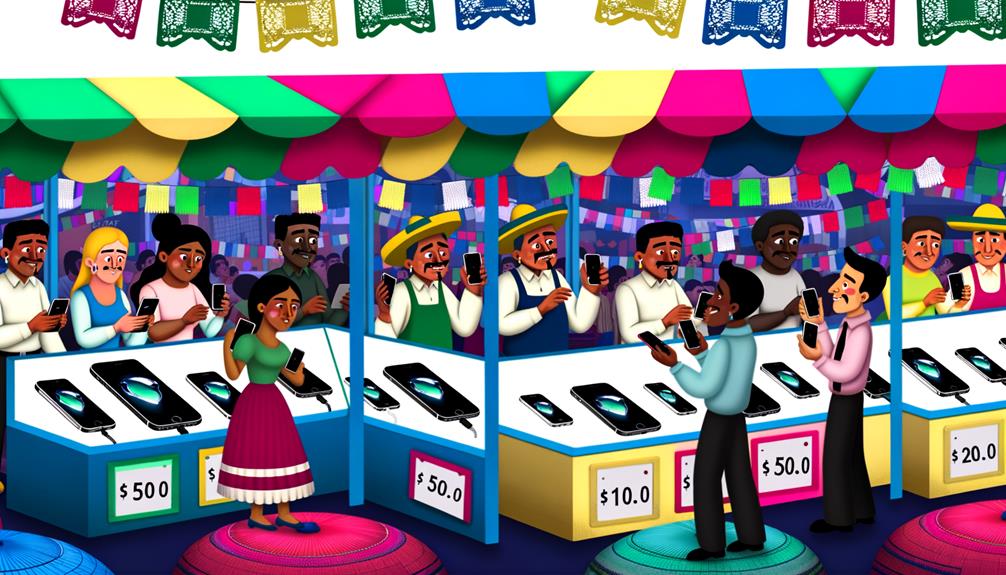





Leave a Reply